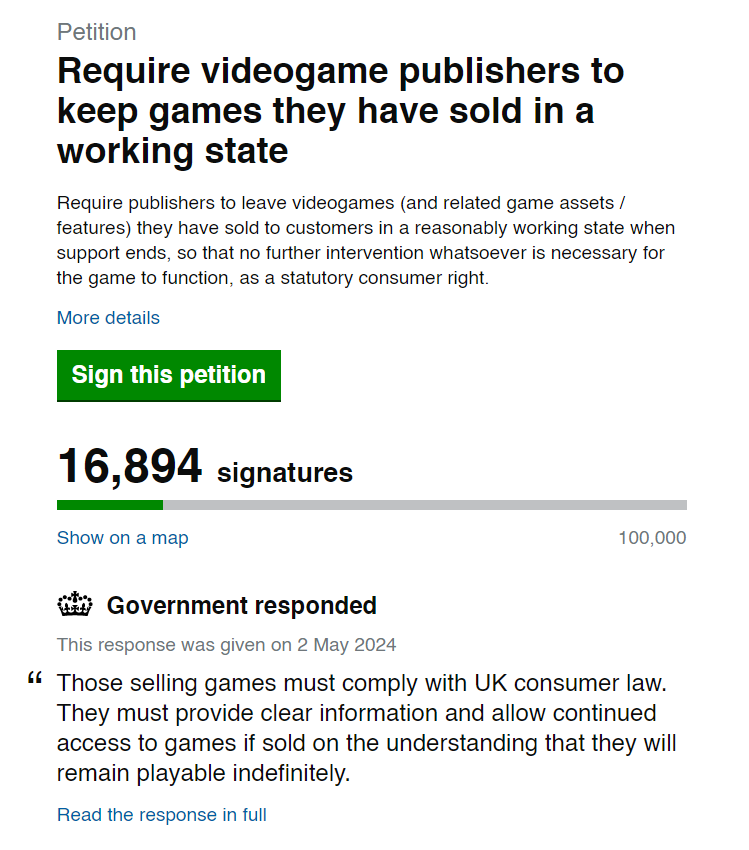I've been helping support a campaign to stop games from being destroyed by companies. Led by Ross Scott, owner of the AccursedFarms YouTube channel, our goal is to keep gamers from being robbed.
The main issue lies in online games, especially those that require a server connection to function. Whenever a game's support is dropped by a company, they shut down the servers. Sometimes, this renders a game unplayable to those who own it. Especially as companies commonly never provide people with tools of their own to host privately, or even to play the game with an offline patch.
This campaign started when Ubisoft announced that The Crew, an expensive racing game with a map that spans the entire United States, will be shutting down on March 31st, 2024, back in December 2023. While the game is mostly played singleplayer, it requires a constant connection to Ubisoft's servers just to even leave the main menu. Ubisoft took players' games away from them, which wasn't even a cheap game to begin with, and have essentially kept the money. There's no offline patch and no server tools for people to take over without further company interference. The game also came on discs for every platform, which will now be a paperweight. So even the "buying it physical" argument simply doesn't work.
The game is sold with a perpetual license just like any other game on the market, which does not expire. It's a copy that you buy full price to own, and not rent. There's a lot more to it than that as well. More on that later.
Our goal with this campaign is a few things:
This campaign mostly affects The Crew owners, but everyone in the long run benefits. You can help too by watching the video and checking out the website. Should you choose to take action on the website, there's plenty of things you can do to help depending on your country, and some options don't even require you to own/prove you own The Crew. For example, some countries have some upcoming petitions we're making that need a handful of signatures to be sent into the governments. The site should let you know when those become publicly available, but overall, you can sign the petitions to help out. The other thing too is getting this as much exposure as possible via sharing and social media.
For more information, visit the Stop Killing Games website, which even has an FAQ page. Also watch Ross's video on the matter, as he goes in-depth with what we're doing, and why we're doing it.
View: https://www.youtube.com/watch?v=w70Xc9CStoE&ab_channel=AccursedFarms
To add my own two cents to the mix, I made a Steam Discussion post on The Crew's community after spending the last couple months doing heavy research and talking to lawyers internationally. It talks about misinformation regarding things like "you were licensed a game, not sold" and "but you signed a ToS/EULA". I highly recommend taking a look and reading it thoroughly.
If you live in the UK, Australia, or Canada, you can sign a petition without requiring The Crew ownership. The only requirement is to be a citizen/resident of the aforementioned country.
United Kingdom Petition: Require videogame publishers to keep games they have sold in a working state
Australia e-petitions
Canada Petition e-4965 - Petitions
The SKG website has information for other things you can do in those countries as well as things you can do if you're not in those countries.
The main issue lies in online games, especially those that require a server connection to function. Whenever a game's support is dropped by a company, they shut down the servers. Sometimes, this renders a game unplayable to those who own it. Especially as companies commonly never provide people with tools of their own to host privately, or even to play the game with an offline patch.
This campaign started when Ubisoft announced that The Crew, an expensive racing game with a map that spans the entire United States, will be shutting down on March 31st, 2024, back in December 2023. While the game is mostly played singleplayer, it requires a constant connection to Ubisoft's servers just to even leave the main menu. Ubisoft took players' games away from them, which wasn't even a cheap game to begin with, and have essentially kept the money. There's no offline patch and no server tools for people to take over without further company interference. The game also came on discs for every platform, which will now be a paperweight. So even the "buying it physical" argument simply doesn't work.
The game is sold with a perpetual license just like any other game on the market, which does not expire. It's a copy that you buy full price to own, and not rent. There's a lot more to it than that as well. More on that later.
Our goal with this campaign is a few things:
- We're not asking for eternal support.
- This is ridiculous. Of course a company can't support a game forever.
- If a game's support is dropped, the game's functionality and playability should be as available as possible offline via an offline patch for the game.
- Provide users with the tools or source code necessary to host their own servers instead.
- This campaign primarily affects games you pay to own and games that contain microtransactions, as you're not only losing access to the copy of the game you bought, but technically you'd also be losing access to the product you bought via MTX.
- None of the above things can be superseded by a terms of service or license agreement.
This campaign mostly affects The Crew owners, but everyone in the long run benefits. You can help too by watching the video and checking out the website. Should you choose to take action on the website, there's plenty of things you can do to help depending on your country, and some options don't even require you to own/prove you own The Crew. For example, some countries have some upcoming petitions we're making that need a handful of signatures to be sent into the governments. The site should let you know when those become publicly available, but overall, you can sign the petitions to help out. The other thing too is getting this as much exposure as possible via sharing and social media.
For more information, visit the Stop Killing Games website, which even has an FAQ page. Also watch Ross's video on the matter, as he goes in-depth with what we're doing, and why we're doing it.
View: https://www.youtube.com/watch?v=w70Xc9CStoE&ab_channel=AccursedFarms
To add my own two cents to the mix, I made a Steam Discussion post on The Crew's community after spending the last couple months doing heavy research and talking to lawyers internationally. It talks about misinformation regarding things like "you were licensed a game, not sold" and "but you signed a ToS/EULA". I highly recommend taking a look and reading it thoroughly.
If you live in the UK, Australia, or Canada, you can sign a petition without requiring The Crew ownership. The only requirement is to be a citizen/resident of the aforementioned country.
United Kingdom Petition: Require videogame publishers to keep games they have sold in a working state
Australia e-petitions
Canada Petition e-4965 - Petitions
The SKG website has information for other things you can do in those countries as well as things you can do if you're not in those countries.
Last edited:



